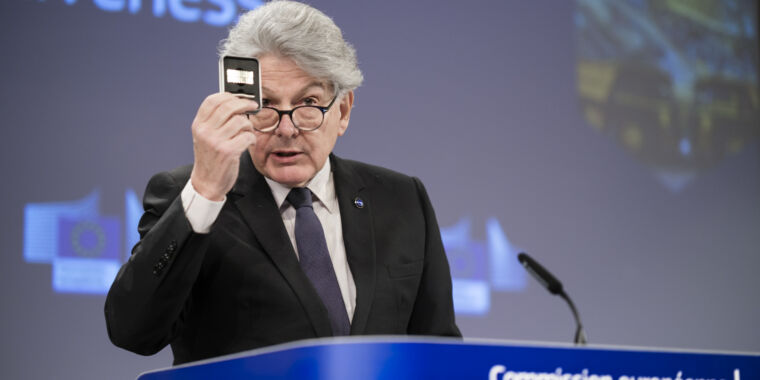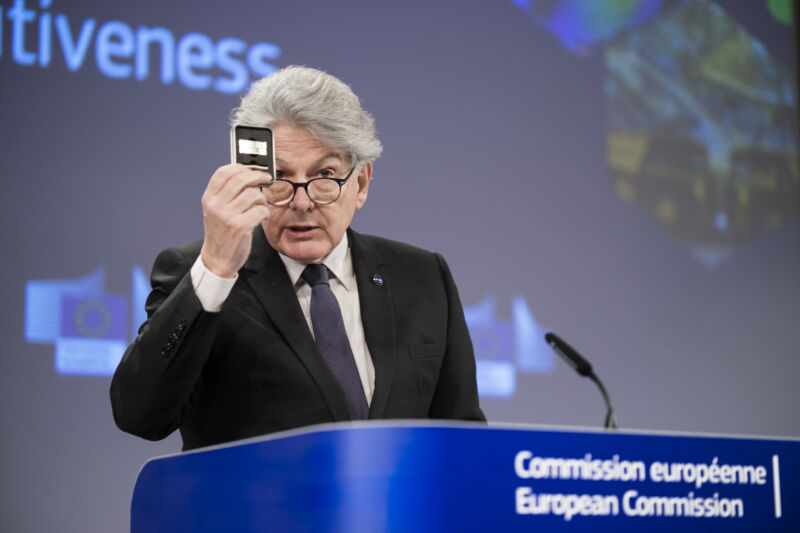
Europe’s major satellite players line up to build Starlink competitor
The bid includes large players such as Airbus Defence and Space, Eutelsat, and SES.
The bid includes large players such as Airbus Defence and Space, Eutelsat, and SES.
ERIC BERGER - Today at undefined
EU Commissioner for Internal Market Thierry Breton wants Europe to have its own secure satellite communications network.
A consortium of nearly every major European satellite company announced Tuesday that it plans to bid for a proposed satellite constellation to provide global communications. Essentially, such a constellation would provide the European Union with connectivity from low-Earth orbit similar to what SpaceX's Starlink offers.
The bid, which includes large players such as Airbus Defence and Space, Eutelsat, SES, and Thales Alenia Space, comes in response to a request by the European Union for help in constructing a sovereign constellation to provide secure communications for government services, including military applications.
European Union Commissioner Thierry Breton announced the continent's plans for this constellation—known as Infrastructure for Resilience, Interconnectivity and Security by Satellite, or IRIS²—last November. The European Union will provide 2.4 billion euro, with additional contributions expected from the European Space Agency and private investments.
"IRIS² establishes space as a vector of our European autonomy, a vector of connectivity and a vector of resilience," Breton said at the time. "It heightens Europe's role as a true space power. With a clear ambition and sense of direction."
Putting the band together
The partnership announced Tuesday, which also includes Deutsche Telekom, Hispasat, OHB, Orange, Hisdesat, and Telespazio, will aim to create a state-of-the-art satellite constellation based on a multi-orbit architecture. Although it is top-heavy with established industry players, the partnership said it will encourage startups in the European space sector to join the coalition. This is in response to a desire by Breton to broaden the European commercial space sector.At present, Europe estimates the cost of this constellation at about 6 billion euro and desires it to be ready to provide global coverage by the year 2027. Both the budget and the timeline for this project are likely very ambitious, given the amount of coordination needed and the unlikelihood that Europe's Ariane 6 rocket will have the spare launch capacity to get hundreds of satellites into low-Earth orbit starting in the mid-2020s. The Ariane 6 rocket will not debut until 2024 at the earliest.
However, European officials felt as though they had to make this move. Fundamentally, the continent faced a difficult choice. Europe seeks to remain a major player in spaceflight activities, which increasingly include satellite-based communications. However, European officials did not want to be beholden to Elon Musk and his Starlink constellation, which already provides secure global communications like those to be delivered by IRIS². European government leaders are already wary of relying on SpaceX's Falcon 9 rocket for the launch of some of its satellites. Officials were similarly disposed toward Amazon's Project Kuiper constellation.
China is also developing its own megaconstellation, but Europe clearly did not want to hand over its secure communications to a global rival with questionable intent. That left OneWeb. But this network is partially owned by the United Kingdom—which very publicly exited the European Union a few years ago—and may not have the capacity to meet all of Europe's needs.
Nimbleness needed
And so European officials felt the need to strike out on their own. Certainly European companies have a lot of expertise in building satellites, and the European Space Agency's experience in developing the Galileo and Copernicus constellations will aid in plans moving forward.The real challenge is coordinating all of this. There are serious questions about how all of these big partners can work together and whether the bureaucracy of the European government can get this project moving forward expeditiously toward the 2027 target date.
By way of comparison, SpaceX launched its first two test satellites in February 2018. From that time it took about four years for SpaceX to begin rolling out global coverage on its Starlink network. But SpaceX had some major advantages in that it had zero bureaucracy—for better or worse, decisions are made by one person, Musk—ample funding and a willingness to spend private capital, and the world's only reusable, high-cadence rocket.
All of these will be challenges for Europe to overcome.



